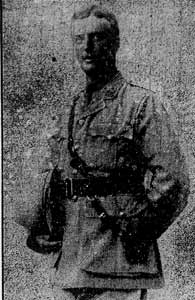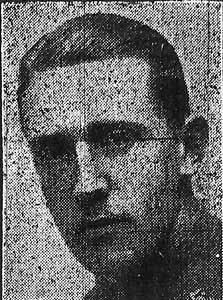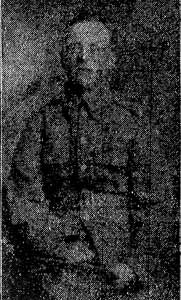
'THE GREAT WAR', 'THE WAR TO END WAR', 'WORLD WAR 1'
'What passing-bells for these who die as cattle?
- Only the monstrous anger of the guns.'
from 'Anthem for Doomed Youth'
by Wilfred Owen
1914 - 1918
'Oldham Terriers - Their Part in the War'
by Sergeant Maurice Bradbury, M.M.
Oldham Territorials, 1/10 Battalion, Manchester Regiment
Transcriptions of the series of articles published in the 'Oldham Standard' in Spring 1919.
MARCH TO GALLIPOLI TRENCHES Before the men reached the shore at Cape Helles they had their first experience of what a high explosive shell could do. A column of black smoke, accompanied by a huge mass of debris, seemed to rise from nowhere on the beach, and by the time the Oldham lads stepped on terra firma half a dozen men of the 29th Division were being placed on boats for hospitals in Malta or Alexandria and eight or nine mules lay in contorted attitudes awaiting burial.
When the two companies were lined up the remnants of a battalion of the Dublin Fusiliers came past in single file. There are few things more touching than the look in the eyes of a strong man fought to a standstill and who has been tottering on the brink of eternity for days which seem years. These men had that look. They were somehow miraculously left from the carnage of the first landing. Bearded and hard fought and very dirty, they yet had that wonderful optimism of the old regular soldier, and their faces lit up with pleasurable smiles to se new blood arriving, which meant probably a relief for them and the avenging of their comrades. By this time it was pretty well known that the other two companies of the battalion had landed prior to the Haverford putting in and had been pushed up to support the French troops on the right and just before dusk Colonel Rye led his half battalion up the first slope of the beach, past the village of Seddul Bar, and down into the shelter of the valley beyond, in full view of the renowned Achi Baba. Men were told to roll in their blankets for the night in the open and await further orders. The memory of that first night on Gallipoli will have faded little in the minds of those men who were there and are still living. It was cold and uncomfortable where they lay, but had they known they were only three or four miles from the Turkish line and what damage could be done by shrapnel had the Turk located them they would have been far more uncomfortable. The writer was sleeping side by side with a brawny sergeant that night and he remembers well awakening about 2 a.m. and crushing his head against that of his bed fellow to borrow some warmth. Five minutes later he was alternately hot and cold for a full minute, for there came what seemed like the crack of doom from a bush about ten yards to the rear and when he had come down after jumping several feet in the air, literally speaking, someone whispered to him that it was "only one of ours." After that there was little sleep, for the artillery barked all night, and when dawn came it brought with it a view of pretty looking white puffs high in the air which several of the boys examined with keen interest, till one amongst them got a nasty rap on the back with a piece of lead, and then it was understood that even high bursting shrapnel is not sent for amusement. About 9 a.m. the order came to move up, and perhaps a mile nearer the line the men were halted, and Colonel Rye and the Adjutant were joined by Captain Newton, who gave hime the exact position of the other two companies, and told how best to join them. The men were lounging in various attitudes is an open field, and listening with curious interest to the bursting of shells and the occasional crack of rifles, sometimes developing into a volley. The Turk, with perfect observation from the higher slope of Achi Baba, must have detected movement, and overhead shrapnel began to burst much nearer, with the result that one man was wounded in the foot. Later in the afternoon the companies moved forward, and after about half an hour's marching came under rifle fire. Kipling once suggested that only young soldiers ducked from the "phizz" of a bullet, for old ones knew that they would never hear the bullet which hit them. It is an exploited fable, for all men duck when the now familiar "phizz" is heard, no matter what their campaigning may have been, and were the earth water, men would duck out of sight. There was little "wind up" then when fellows came under fire; they had not seen sufficient destruction wrought to give them that profound respect for the bits of lead which they later developed, and they trudged into the reserve trenches behind the French with laughter in their eyes, and one twitting another. It was on the journey up that the battalion had its first man killed in the person of Pte. Warrener, who died instantaneously when hit by a shell. When night came there were the original two companies in close support, and the latter two companies about a couple of hundred of hundred yards behind, and men had used what daylight was left to them to make the rough trenches more secure against shell fire. Towards nine o'clock several battleships drew into the entrance to the Narrows, and for an hour there was the sound as of express trains going through the air, and tremendous explosions in the Turkish lines. An hour later the Colonel's voice shouting "Stand to, the Turks are attacking," brought men to the parapet with rifles ready. Lights were going up all along the front and the sound of musketry was like the crackle of a tremendous fire, and shrapnel was bursting with its usual savage ring. It was their first night and men could be excused if they looked one at another and wondered what fearsome thing would follow next. A staff officer who had rushed up with orders to Col. Rye, was lying with his head on the Adjutant's knee and a bullet in his stomach, and men were firing at movement and asking questions afterwards. Little did they think that that first night so full of horrors and surprises was to be the fore-runner of so many hundreds compared to which it would appear quiet enough to inspire the familiar communique "There is nothing to report on the rest of the front." When morning came and the sun with it and comparative quiet it was found the Turks had been driven back easily and that there was nothing to get alarmed about. After a few days in these trenches the Battalion took over a section of the front line on the left of the French and on the right of the 29th Division, and casualties now began to be daily. The Turks were several hundred yards from our front lines and some kind-hearted staff officer decided that as British troops with aggressive qualities it was up to us to get considerably nearer "old Johhny," and a certain night was picked for "digging in" some two hundred yards in front of our front line. Men who had to go out looked anxiously at the darkening sky and prayed for no moon to appear and their prayer was heard for the night was pitch dark until several feet of earth had been taken off and then a watery moon appeared and the wily Turk opened fire on movement. "Digging-in" is a phrase which probably conveys little to the outsider, but men who have done it can explain that more than once they have torn at sods with their teeth and nails in a frantic attempt to get cover for the head, and this happened that night. However, the new line was held until the following evening, when the Battalion was relieved by the 1/16th Battalion Manchester Regiment. The night of that relief was one of the most memorable on Gallipoli. Early in the evening the heavens opened, or in other words a cloud burst, and in less than half-an-hour the new trench was up to the waist in water and the stream running down the middle of the centre Krithia Nullah was swelled into a torrent. Blankets and greatcoats came down and rolling helplessly from side to side were the dead bodies of Turks washed down from the slopes of Achi Baba, and to add to the misery of it all the Turks, suspecting a relief to be in progress, poured shrapnel and bullets on the newly acquired ground. It was during this relief that Lieut. J. Clegg was killed, an officer whose memory old members of the battalion will always treasure. He was fearless, and a gentleman always. The stretcher bearers carried his body out for burial behind the line and on the way down one of the many sad coincidences of this war occurred. A sergeant of the relieving 1/6th Battalion asked to see his body, and knew it was that of his brother, and he himself was going into the trench and was killed shortly afterwards. The Battalion went into dug-outs some three miles behind the line alongside the French 75s. Dug-outs in those pioneer days were not the palatial well-lighted thirty-feet affairs of the latter days of the war, they were grave-like holes with not enough dirt in front to protect one from a peashooter, as men of the 10th found to their sorrow when, about five in the afternoon, the Turkish artillery spotted them and rained shrapnel on them for an hour, whilst men helplessly flattened themselves to the earth the earth and into it, and trusted to luck. Through it all the late Capt. Baird, the medical officer, was a perfect hero. With shells bursting round him he went from hole to hole succouring the wounded, and showed an example of fearlessness by which everybody benefited. When this bout of shelling was over it was found the toll had been great; the Battalion having lost eight or nine killed outright and a number wounded. The following day orders came that the battalion had to reinforce the Royal Fusiliers and the Hants. of the 29th Division in preparation for one of the greatest battles Gallipoli saw, "the 4th of June."
|
'Oldham Men's Fights on Many Battlefields' |
Final Days in Egypt |
Journey to Gallipoli |
March to Gallipoli Trenches Part 4 |
Gallipoli's Decisive Battle |
Return to Cape Helles |
The Battle of Romani |
Approach to the Trenches |
Horrors of Ypres in 1917 |
Greatest Battle of All Times |
The Grand Slam
~~~~~~~~~~ Weeks of Continuous Fighting ~~~~~~~~~~ Oldham Lads Face Hail of Bullets ~~~~~~~~~~~ A Glimpse of Unsurpassed Heroism |
Last Stages of the Struggle |
Transcriptions by Sheila Goodyear :


